If a party violates ICSID Rules of Arbitration, the aggrieved party can make a prompt
objection. Otherwise, Rule 27 creates a deemed waiver. ‘A party which knows or should
have known that a provision of the Administrative and Financial Regulations, of these Rules,
of any other rules or agreement applicable to the proceeding, or of an order of the Tribunal
has not been complied with and which fails to state promptly its objections thereto, shall be
deemed—subject to Article 45 of the Convention—to have waived its right to object.’
What are the time limits and deadlines?
Under Rule 26 of ICSID Arbitration Rules, ICSID Tribunals have the power to set and
extend deadlines for parties’ submissions. ‘(1) Where required, time limits shall be fixed by
the Tribunal by assigning dates for the completion of the various steps in the proceeding. The
Tribunal may delegate this power to its President. (2) The Tribunal may extend any time limit
that it has fixed. If the Tribunal is not in session, this power shall be exercised by its
President.’ Yet if a party takes such steps after its deadline expires, under Rule 26(3), this
shall be disregarded unless Tribunal ‘in special circumstances and after giving the other party
an opportunity of stating its views, decides otherwise.’
What are ancillary claims?
There are three types of ancillary claims 1 under Article 46 of ICSID Convention: (a) An
incidental claim arises as a consequence of the primary claim, such as interest or
compensation for procedural costs; (b) An additional claim is made by way of a later
addendum to the original claim; (c) A counterclaim is a claim made by the respondent.
‘Except as the parties otherwise agree, the Tribunal shall, if requested by a party, determine
any incidental or additional claims or counterclaims arising directly out of the subject-matter
of the dispute provided that they are within the scope of the consent of the parties and are
otherwise within the jurisdiction of the Centre.’ Under Rule 40(2), incidental/additional
claims must be presented no later than in the parties’ reply. Counterclaims must be presented
no later than in the counter-memorial. Tribunal can authorise their presentation later after
hearing the other party’s objections.
Describe how written and oral proceedings take place.
ICSID Convention (Articles 43 and 44) has only general provisions regarding arbitral
procedure. Rule 29 provides for two distinct phases: Written and oral procedures. This is
subject to modification by parties’ agreement.
Written proceedings
Under Rule 31(1), the pleadings required are: (a) Request for Arbitration; (b) Requesting
party’s filing of the memorial; and (c) Opponent party’s filing of the counter-memorial. If
Tribunal requests or parties agree, they may also file additional submissions including Reply
and Rejoinder.
Memorials shall contain statement of relevant facts, statement of law, submissions,
and exhibits. Further request for document production may be made.
1
Christoph Schreuer and others, ‘Ancillary Claims’ in The ICSID Convention: A Commentary (Cambridge
University Press 2009) para 2
, Counter-memorials/Reply/Rejoinder shall contain admission/denial of facts in last
pleading, additional facts (if necessary), observations concerning statement of law in last
pleading, statement of law in answer, submissions and exhibits.
Oral proceedings
Under Rule 21, Pre-hearing conferences may precede oral proceedings. Under Rule 32,
Tribunal shall decide which parties (except parties, agents, counsels, advocates) can attend
the hearing, with parties’ consent. Tribunal can question the excepted parties, as well as
witnesses and experts. Parties can examine the witnesses of fact and experts. Under Rule
32(2), witnesses and experts may only attend the hearing during their testimony, unless the
parties agree to allow them to attend in its entirety. Tribunal can open the hearing to the
public if the parties agree.
Immunities facilitating the conduct of proceedings
Article 21 provides legal immunities to arbitrators and ICSID Secretariat’s officers and
employees. They are common in international organisations’ laws. Article 22 provides that
they are partially extended to ‘parties, agents, counsel, advocates, witnesses or experts’,
particularly to ensure their ‘travel to and from, and their stay at, the place where the
proceedings are held’. In Libananco v Turkey2, Claimant complained that Turkish authorities
were holding Libananco’s legal representative and potential witnesses under surveillance and
there was interception of email communications of Libananco’s counsel in the dispute.
Tribunal recognised that the allegations affected the afforded immunities and ordered
Claimant to provide Respondent with list of persons to whom Claimant considered Article 22
was applicable.
Under Regulation 31(1) of the Administrative and Financial Regulations, ‘The
Secretary-General may issue certificates to members of Commissions, Tribunals or
Committees, to officers and employees of the Secretariat and to the parties, agents, counsel,
advocates, witnesses and experts appearing in proceedings, indicating that they are travelling
in connection with a proceeding under the Convention.’
Under Article 103 of UN Charter, its obligations shall prevail if they conflict with
other international agreement obligations. These include conducting UN Security Council’s
binding decisions. Thus it is doubtful if persons subjected to targeted travel sanctions
imposed by UN Security Council intend to rely upon Article 223. For example, in
Funnekotter v Zimbabwe4, French authorities denied visa to Attorney-General of Zimbabwe
due to targeted EU travel sanctions in late 2006. He was replaced by another official.
Describe the rules of evidence.
Power of the Tribunal to Call for Evidence and Conduct Inquiries
Under Article 43 of ICSID Convention, Tribunal has power to order evidence production.
‘Except as the parties otherwise agree, the Tribunal may, if it deems it necessary at any stage
of the proceedings, (a) call upon the parties to produce documents or other evidence, and (b)
visit the scene connected with the dispute, and conduct such inquiries there as it may deem
2
Libananco v Turkey, ICSID Case No. ARB/06/8, Decision on Preliminary Issues (23 June 2008)
3
Christoph Schreuer and others, ‘Immunities of parties and witnesses’ in The ICSID Convention: A
Commentary (Cambridge University Press 2009) para 8
4
Funnekotter v Zimbabwe, ICSID Case No. ARB/05/6




